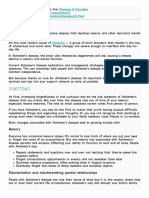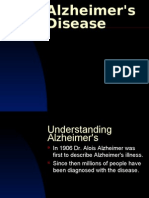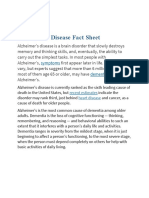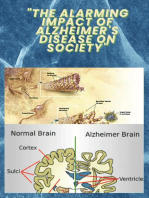Passage 1. Alzheimer
Passage 1. Alzheimer
Uploaded by
Raana R. SherwaniCopyright:
Available Formats
Passage 1. Alzheimer
Passage 1. Alzheimer
Uploaded by
Raana R. SherwaniOriginal Title
Copyright
Available Formats
Share this document
Did you find this document useful?
Is this content inappropriate?
Copyright:
Available Formats
Passage 1. Alzheimer
Passage 1. Alzheimer
Uploaded by
Raana R. SherwaniCopyright:
Available Formats
Passage 1.
Alzheimer
Alzheimer's disease is a brain disorder that is presently considered to be the leading cause of senile
dementia. The disease gained its name from Alois Alzheimer, a German neurologist who identified the
disease in 1906. Victims of the disease are known to develop brain growths, called neuritic plague
that consists of degenerated nerve endings.
Alzheimer's disease was initially associated with old age since most of the symptoms linked to the
disease are known to lead to senility which is part of the aging process. The disease first came to light
when the first patient was considered too young to be senile. Dr Alzheimer's patient was a fifty five
years old woman with a four year history of memory loss, depression, hallucinations and no reasoning
ability. Taking particular interest in the disease, Alzheimer conducted an autopsy which revealed a
strange cluster of degenerated brain tissue and nerve endings.
The disease has come to be known today as one of the most appalling diseases that can strike
mankind. It is a killer disease which systematically strips its victims of their physical and mental
capabilities. The mind goes first, so that the victim and those around him feel that he is losing his
sanity. The body which slowly degenerates, soon follows until the victim is reduced to a helpless
vegetable. The deadly disease is fully capable of striking anyone and everyone without any regard
whatsoever to age, intelligence or ability.
Diagnosing Alzheimer's disease can be rather difficult since the symptoms of Alzheimer's are very
similar to those of depression. Parkinson's disease and multi infarct dementia which is the softening of
the brain tissue. most of the time, the disease brings with it memory loss which is quite common in
older people and when the fact was made known to the public, there was a mild case of panic.
However, there is no reason to do so since most people aged sixty five and above all will tend to
experience some form of memory loss, it is also common for victims to find themselves doing bizarre
things like wandering off and not knowing how to get back home. Advanced stages of the disease
also go far beyond mere memory loss and can take a heavy toll on the brain thus collapsing a victim's
judgement.
While the effects of Alzheimer's disease can be rather devastating for the victim himself, experts also
worry about the effects of the disease on the victim's families. Alzheimer's patients need round the
clock supervision and as the illness gets progressively worse, so does the burden on the family. As in
many other terminal illnesses, Alzheimer's has the tendency of worsening trivial problems in the
family. I f there has been a poor relationship between parent and child before the illness, for example
the child might start feeling guilty about past events and the fact that it is too late to make amends.
Spouses also begin to feel resentful since practically every waking moment is spent on a person who
is incapable of cooperation, affection and gratitude. Since Alzheimer's disease is thought to be
irreversible, the disease also adds to a dismal sense of hopelessness which leads to both physical
and emotional exhaustion and very often, the care giver becomes quite ill himself. The families are
also eventually forced to deal with financial and legal matters since the end result of Alzheimer's
disease is always the nursing home which serves as the only solution. This further adds to a sense of
guilt and failure for the family since it signifies the final stage of the fatal disease.
It has now been a century since the disease was first discovered. While the cause of Alzheimer's itself
remains a mystery. Alzheimer's patients are known to be lacking in a brain chemical called
acetycholine. This substance which is required for the communication between nerve cells, is not
directly absorbed. As such, attempts have been made to increase choline which is used by the body
to make acetycholine. Doctor's hope that Alzheimer's may be treated increasing the amounts of
choline in the diet through capsules. However, such trials have proved disappointing and show no
significant improvement in the condition of Alzheimer patients. Nevertheless there is hope for the
future.
You might also like
- The Treatment Effects of Invisalign Orthodontic Aligners100% (1)The Treatment Effects of Invisalign Orthodontic Aligners6 pages
- Apollo Munich Health-Wallet-Brochure - NEW - 8x8 PDFNo ratings yetApollo Munich Health-Wallet-Brochure - NEW - 8x8 PDF9 pages
- Pathology Outlines - Papillary Carcinoma - GeneralNo ratings yetPathology Outlines - Papillary Carcinoma - General6 pages
- Your Guide to Health: Alzheimer's: Reliable Information for Patients and Their FamiliesFrom EverandYour Guide to Health: Alzheimer's: Reliable Information for Patients and Their FamiliesNo ratings yet
- Alzheimer'S Disease: Is A Progressive and Fatal Brain Disease. More Than 5 Million Americans Now HaveNo ratings yetAlzheimer'S Disease: Is A Progressive and Fatal Brain Disease. More Than 5 Million Americans Now Have7 pages
- Effects of The Alzheimer's Disease/ Essay / PaperNo ratings yetEffects of The Alzheimer's Disease/ Essay / Paper5 pages
- Alzheimer: Simple Yet Complex: Symptoms of This Disorder Are As FollowsNo ratings yetAlzheimer: Simple Yet Complex: Symptoms of This Disorder Are As Follows2 pages
- Alzheimer's Care - The Caregiver's Guide to Understanding Alzheimer's Disease & Best Practices to Care for People with Alzheimer's & DementiaFrom EverandAlzheimer's Care - The Caregiver's Guide to Understanding Alzheimer's Disease & Best Practices to Care for People with Alzheimer's & Dementia1/5 (1)
- What Is Alzheimer's - Alzheimer's AssociationNo ratings yetWhat Is Alzheimer's - Alzheimer's Association6 pages
- Alzheimer's Disease (AD), Also Called Alzheimer DiseaseNo ratings yetAlzheimer's Disease (AD), Also Called Alzheimer Disease4 pages
- Alzheimers - Association - Topics - 12 - 10 - 2019 2 PDFNo ratings yetAlzheimers - Association - Topics - 12 - 10 - 2019 2 PDF34 pages
- The Basics of Alzheimer's Disease: Dipil PatelNo ratings yetThe Basics of Alzheimer's Disease: Dipil Patel15 pages
- Alzheimer's and Dementia Basics: What We Know Today Understanding Dementia100% (1)Alzheimer's and Dementia Basics: What We Know Today Understanding Dementia9 pages
- Alzheimer'S Disease: Amoranto - Azugue - Bamba - Caser - Nhiyam - RaymundoNo ratings yetAlzheimer'S Disease: Amoranto - Azugue - Bamba - Caser - Nhiyam - Raymundo34 pages
- Diseases & Disorders Dementia, Alzheimer's Disease100% (1)Diseases & Disorders Dementia, Alzheimer's Disease11 pages
- To Start Off, When Was Is Discovered?: 906: Dr. Alois Alzheimer First Describes "A Peculiar Disease"100% (1)To Start Off, When Was Is Discovered?: 906: Dr. Alois Alzheimer First Describes "A Peculiar Disease"5 pages
- Alzheimer's Disease Fact Sheet: Symptoms DementiaNo ratings yetAlzheimer's Disease Fact Sheet: Symptoms Dementia16 pages
- Dealing with Dementia: The Long ‘Long Goodbye’ and All That CareFrom EverandDealing with Dementia: The Long ‘Long Goodbye’ and All That CareNo ratings yet
- Products & Services: Book: Mayo Clinic Guide To Stress-Free LivingNo ratings yetProducts & Services: Book: Mayo Clinic Guide To Stress-Free Living10 pages
- Alzheimer's Disease: Causes, Symptoms and TreatmentsNo ratings yetAlzheimer's Disease: Causes, Symptoms and Treatments5 pages
- Fernández-Aranda, 2020. COVID-19 and Implications For Eating Disorders.No ratings yetFernández-Aranda, 2020. COVID-19 and Implications For Eating Disorders.7 pages
- 5F Hourglass™: Post Clearance - Clinical Observation StudyNo ratings yet5F Hourglass™: Post Clearance - Clinical Observation Study4 pages
- Dextroamphetamine: Brand Name: DexedrineNo ratings yetDextroamphetamine: Brand Name: Dexedrine23 pages
- Long-Term Efficacy and Safety of Ertugliflozin Monotherapy in Patients WithNo ratings yetLong-Term Efficacy and Safety of Ertugliflozin Monotherapy in Patients With23 pages
- A Web-Based Self-Management Exercise and Diet Intervention PDFNo ratings yetA Web-Based Self-Management Exercise and Diet Intervention PDF11 pages
- Animal Biotechnology Dylan Ayekpam 2167015No ratings yetAnimal Biotechnology Dylan Ayekpam 21670153 pages
- 09 - Networking and Health Information Exchange - Unit 4 - Basic Health Data Standards - Lecture ANo ratings yet09 - Networking and Health Information Exchange - Unit 4 - Basic Health Data Standards - Lecture A17 pages
- National Leishmaniasis Training - Partcipant Module Draft - 2019 FinalNo ratings yetNational Leishmaniasis Training - Partcipant Module Draft - 2019 Final65 pages





























































































